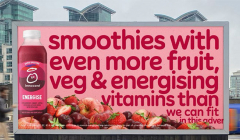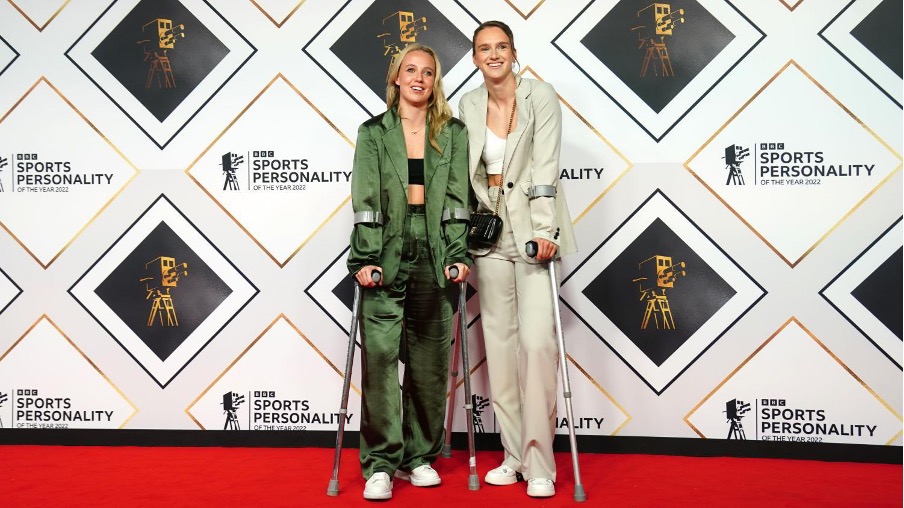
Innocent campaign is jam-packed with goodness
Neverland helps bring to life the amount of fruit, veg and vitamins in Innocent smoothies and juices

How Anterior cruciate ligament injuries (ACL) are affecting women in sport and what brands can do to support female athletes.

With many of the world’s greatest female footballers sidelined through injury the pressure's on sportswear manufacturers and governing bodies to tackle the issue. But it’s not only them that can help to fix the biggest problem in women’s football, this is something we can all help to solve.

You may be wondering why this photo of footballer's Beth Mead and Vivianne Miedema looks more like a scene from a hospital waiting room than the red carpet at the Sports Personality of the Year Awards.
The answer is shocking.
They're both sidelined from football with anterior cruciate ligament injuries (ACL) - an injury that's 4-6 times more likely to affect women than men.
During the 2021/22 season 57 players in the top tier of women's football were sidelined due to ACL injuries and in the last five months alone you could field an all-star XI of international players out of action because of their ACL.
Last year Ballon D’or winner and the GOAT of women's football, Alexis Putellas, was sidelined for the Euros and this season the Lionesses are likely to be without their captain Leah Williamson, Fran Kirby and Beth Mead going into the World Cup.
So far a lot has been made about biology; females generally have wider hips than men which increase the leg’s angle to the knee.
Studies also suggest that the menstrual cycle could even play a part with oestrogen affecting joint stability.
Who knew? We're blessed with yet another unwanted side effect of the menstrual cycle.
And, it's widely reported that women wearing ill-fitting boots designed for men could be a significant problem.
There is mounting pressure for sportswear brands to design boots specifically for women, and rightly so - it’s 2023 FFS - women should have boots that fit.
But to only look at biology is to ignore the bigger problem. We also need to examine societal behaviours and the role they play.
For women and girls the amount of time spent with coaches and physios is, in most cases, significantly lower than men and boys. As a society do we put an equal emphasis on how grassroots girls teams train and develop compared with boys?
There is still work to be done to change our perception of what a female athlete looks like
Viv Bowdler, Strategy Director at Dark Horses and Founder of Injury FC
In women's sport access to quality physios and medical experts is harder to come by. In fact a physio or team doctor working in the Women’s Super League will get paid 50% less than one in the Premier league.
Speaking of doctors, they say that the quality of playing surfaces can increase the risk of injury to your ACL. How many women and girls teams have access to funding that goes towards paying for adequate facilities?
There is still work to be done to change our perception of what a female athlete looks like. Generally speaking the focus for women is around losing weight vs gaining muscle so typically women and girls do less resistance and weight training.
It’s also been said that gender bias can influence the perception of pain and management of injuries for women. Last month Nurofen launched the second phase of “See My Pain” a campaign highlighting that exact issue.
But perhaps the most concerning fact of all is that only 6% of research in sports science is conducted exclusively on women.
Crazy isn't it? 6%!
If you've read Caroline Criado-Perez's book Invisible Women you'll be very familiar with the prevalence of gender data bias in the world. And if you haven't read the book, you should.
Put these factors together and we've got a big problem;
We're talking about the greatest female footballers in the world missing out on the biggest tournaments.
In men’s football this is the equivalent of Kane, Mbappé and Messi out of the World Cup. Can you imagine the outcry!?
But it’s not all doom and gloom.
For brands this presents a huge opportunity to help solve the biggest problem in women’s football.
When Volvo learnt that women are more likely to be injured in a car crash because only male dummies are used in crash tests, they collected 40 years worth of data to understand more. They then open sourced their findings with the rest of the car industry.
This ACL problem is crying out for a brand to follow suit and conduct further studies. And once these studies are done - they should be shared far and wide with actionable steps to help tackle the problem.
If sportswear brands can work with medical experts to design women's boots what else can be done to help address the societal issues?
For the women's Euros Adidas’ linked up with VERSUS to provide 150 hours of free access to Powerleague pitches for women and girls. A great example of brands doing something useful to help solve a problem.
If we need to improve access to physios could an insurance brand offer discounted health care to all female grassroots players suffering from ACL injuries during the World Cup?
Or what’s stopping existing women’s football partners from providing access to physios and club doctors to girls teams across the UK?
Could a health and fitness app launch a physio-led training programme with strengthening exercises and techniques for proper landing and pivoting specifically designed to prevent ACL injuries in women?
Or because it’s argued that women's pain is ignored are there ways for brands to offer more support for female players on their road to recovery? Something for a mental wellness brand.
For a brand this is a challenge that presents a huge opportunity: A chance to offer practical and authentic solutions to a big problem in sport.
Let's remove the assumption that if you're not a sportswear manufacturer or a governing body then this problem isn't yours to fix. If that's your attitude you could be missing an open goal for your brand.
Viv is the newly appointed Strategy Director at Sports Creative agency Dark Horses, previously she was the UK Lead Strategist at Twitter. Founder of Injury FC, a Women’s & Non-binary Football Club, a member of the organisation Women In Football and a D&AD New Blood Judge. She has a self-proclaimed unhealthy obsession with Manchester City.
Looks like you need to create a Creativebrief account to perform this action.
Create account Sign inLooks like you need to create a Creativebrief account to perform this action.
Create account Sign in